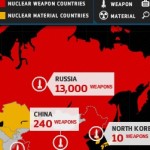Japan’s Radical Energy Technocrats: Structural Reform Through Smart Communities, the Feed-in Tariff and Japane…
Archives
Nuclear Warfighting to Defeat a DPRK Attack: Unnecessary, Disproportionate, Incredible, and Self-Defeating
Peter Hayes Nautilus Institute Forthcoming NAPSNet Special Report November 2014 In 1978, Bryan Jack and a team of analysts at Pan Heuristics asked how nuclear weapons might be used to blunt a North Korean all-out attack on the South?[i] Their analysis (which posited South Korean nuclear weapons, but the results are identical if American nuclear […]
Energy Security Concepts for Sustainable Development in Northeast Asia
David F. von Hippel 18 March 2014 Nautilus Institute This paper was prepared with support from the Hanyang University Energy Security and Governance (EGS) Center as EGS Working Paper Number 2014-06, available as http://www.egskorea.org/common/download.asp?downfile=Working_Paper_2014_60.pdf&path=board The Center for Energy Governance & Security was started in 2012 with a major grant from the Korean Ministry of Education. Located at Hanyang […]
Spent Nuclear Fuel Management in China

by Xuegang Liu Division of Nuclear Chemistry and Engineering The Institute of Nuclear and New Energy Technology Tsinghua University, Beijing, China 5 August 2014 I. INTRODUCTION With a population exceeding 1.3 billion and high economic growth averaging ~8% since the early 1980s, China’s demand for energy has increased dramatically. As of 2013, China is the world’s second […]
Update on ROK Energy Sector and Energy Policies
by Woo Jin Chung Korea Energy Economics Institute, Republic of Korea 22 July 2014 I. ABSTRACT This paper presents the status of energy supply and demand in the Republic of Korea (ROK), as well as a description of current and recent policies related to the future of the Korean energy sector. The paper outlines the past […]
Update: Potential for Deep Borehole Disposal of Nuclear Wastes in ROK
by Jungmin Kang Exploration of the Potential for Deep Borehole Disposal of Nuclear Wastes in South Korea: An Update[1] 1 July 2014 Visiting Professor, KAIST I. executive summary Since the Republic of Korea’s first nuclear power reactor was placed into operation in 1978, twenty three reactors have been placed into operation, with a total capacity of 20.7 gigawatts […]
Strategies for the Rehabilitation of the DPRK Energy Sector

by David F. von Hippel and Peter Hayes The Nautilus Institute for Security and Sustainability 24 June 2014 Prepared for the International Seminar on Political Prospects of Korean Peninsula and Strategies for North-South Korean Energy Cooperation on 7-8 November 2013, Yeoncheon, Republic of Korea. I. INTRODUCTION During the decade of the 1990s, and continuing into the second […]
The ROK’s Nuclear Energy Development and Spent Fuel Management Plans
by Jungmin Kang 10 July 2014 Originally published 5 March 2014 for Korea Advanced Institute of Science and Technology, Daejeon, Republic of Korea. I. Status of and Prospects for Nuclear Power in the Republic of Korea One of the most rapidly growing developed countries in the world today, South Korea (the Republic of Korea, or ROK) has been increasingly relying on […]
Renewable Energy Burst in Japan
by Kae Takase 28 May 2014 (Originally published February 9, 2014 for Hanyang University Energy Governance and Security (EGS) Center.) I. INTRODUCTION In the tragic aftermath of the March 2011 earthquake (the Great East Japan Earthquake) and tsunami, and the resulting Fukushima nuclear plant disaster, as all of Japan’s fleet of nuclear reactors were shut down, apparently […]
Security Requirements in Northeast Asia

by John On-Fat Wong 14 May 2014 I. INTRODUCTION by peter hayes In 1982, John on-fat Wong wrote a dissertation at the University of Wisconsin that posited that every state in Northeast Asia had gone nuclear. He examines four geopolitical scenarios (1990) for Northeast Asia: general détente, limited bilateral détente, new cold war, and general cold war. […]

